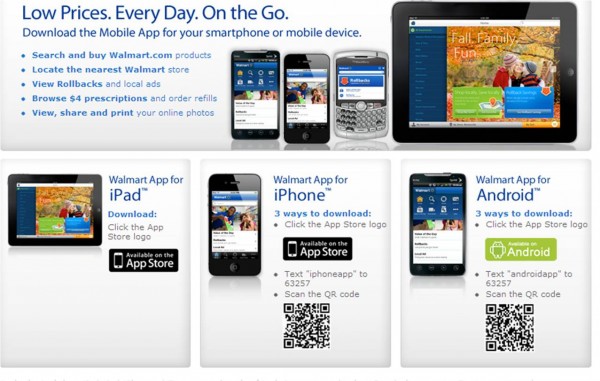(Read in entirety at Search Engine Land. Published 2011.)
Retail brands with popular mobile apps are benefiting tremendously this holiday season from prominent mobile app visibility in Google’s organic search results.
Search for Groupon, eBay, Amazon, Target, QVC or numerous others. Alongside the brand website listing, local listings, and social profiles, searchers are starting to see links to these brands’ iPhone, iPad, and Android app profile pages, right on the first page of Google.
These app page URLs are presenting powerful new opportunities to “occupy” Page 1 of Google SERPs for desktop and mobile searchers, with big payoffs.

eBay’s iPhone App Page Ranks #2 in Google for “eBay”
The opportunity is really the product of a collision between Desktop and Mobile worlds: the explosive popularity of apps are reshaping the Web’s link graph around the App Store and Android Market sites.
It comes as no surprise that “Popular Apps” listed in the App Store and Android Market pages are driven by app download volume and rating quality. But these app profile pages and app “directories” (like the App Store’s Lifestyle category page) are also webpages.
As search engines continue to index, display, and rank app pages for search-dominant mobile users, app-mania is simultaneously driving a geometric expansion of the backlinks and social popularity of these ordinary webpages – giving them extraordinary influence over organic search results.
The net effect, based on our own analysis of top ranking mobile iOS apps, appears to be a powerful feedback loop: App Store popularity gets rewarded by incremental Google visibility.
Higher Google visibility induces more app downloads. More downloading drives higher App Store popularity… and on and on, potentially entrenching popular apps in a rich-get-richer-faster phenomenon:

The App Visibility Cycle (courtesy of pureoxygenmobile.com)
This might seem like bad news for the 99% who have good mobile apps, but aren’t among the “Most Popular” apps listed. But the fact is, this highlights the opportunity – and urgency – for brands to optimize app pages for organic search rankings, to help drive app popularity and other benefits.
Here are five Mobile App SEO tips to get started optimizing your apps for Page 1 Google rankings on brand queries:
Tip #1: Feature your brand prominently in the app name
The app name doubles as the link anchor text within the App Store and Android Market. Getting these sites to link to your app profile page, using your brand name as a link, is critical for tapping into their enormous link equity. (See Groupon, Amazon, and eBay examples below.) Be sure to feature the brand name in the download page URL as well.

Groupon, Amazon, and eBay: Their App Profile Pages Feature the Brand Name as Link Anchor Text
Tip #2: Link to your app profile page(s) from your home page and/or site footer
You have to aim the link equity of your most important pages at your app download pages. Many brands bury these important links.
Consider building a landing page or section dedicated to your apps with screen shots, reviews, features, etc. But it must also have links from the most important pages of your site, and follow the other tips here to make it into Page 1 for brand queries (REI does a nice job of linking to the REI apps).

REI’s internal landing page promoting iOS and Android Apps
Tip #3: Include your brand name in the link text that points at app download pages
Too many brands make the mistake of linking to the app profile page without including the brand name, as in “Download iPhone App.” Even worse, some just link through the “Available on Android/App Store” graphics. (See Walmart example below.) This is a huge missed opportunity! Use your anchor text wisely.
You have to signal that App Store or Android app page is all about your brand (as in “Download the Walmart iPhone app” or “Get the Walmart App for Android.”)

Walmart Links Graphics (No Anchor Text) to App Profile Pages
Tip #4: Provide a QR link to download the app from your desktop site landing page
Use QR codes to give desktop site visitors easy app access. The QR needs to trigger app download on the right device once scanned. Remember to compress the link before your generate the QR. Native Apple and Android app page URLs exceed 50 characters, producing high-density QRs that fail to scan when displayed at small sizes. (Notice the Walmart example above.)
For best results, use a link compression or QR platform that shows you bot QR crawl requests (full disclosure: we provide one). Our prediction is that QR will be a mobile search ranking signal within the next 12 months. Start experimenting now.
Tip #5: Cross-promote your app to mobile users, searchers, and bots
Here’s the magic. You already have a captive mobile audience itching for you to make it easy to discover relevant mobile pages (or your app).
When iPhone, iPad, or Android browsers hit your site (desktop or mobile), provide a link at the top of the page for them to download the appropriate app for their device. (Let’s assume your desktop pages indexed in search engines properly redirect mobile searchers to appropriate mobile pages. If you’re not sure, find out.)
But don’t stop there. For the trifecta, make sure Google’s new Smartphone Googlebot is crawling the app links from your mobile pages as well, using appropriately branded anchor text (not images).

Amazon’s Mobile Site Promotes the iOS and Android App, But Lacks Anchor Text
App Store and Android Market app pages are a powerful new ranking opportunity for desktop and mobile searchers. Retailers and media brands with large volumes of site traffic, page content, link networks, or social popularity, can easily leverage these digital assets to influence app profile page relevance, and app popularity, at the same time.
Categories
Submit a Comment